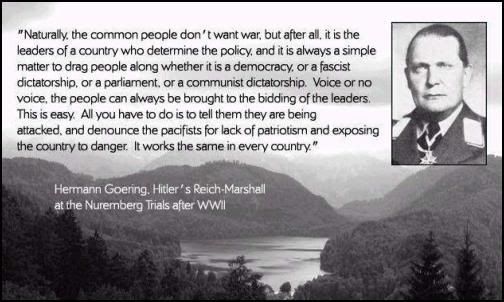You want fiction? Here’s some to mark today’s 5th Anniversary of the Iraq War.
Scene 1
September, 2006: Brothers George, John, and Ringo stand together in the front hallway on George’s house. They have just answered the door, greeting Petraeus, President of a local construction company. They exchange greetings and lead him to the kitchen table, where the conversation begins.
GEORGE: We’re, uh, glad you could come to see us, Mr. Petraeus. As I think my brother John told you when he called, it’s about the house we’re having built on the lot we inherited from our parents.
PETRAEUS: Yes, I’ve taken a look at the house and I’ve talked to the contractors, and the contractors before that, and the original contractors.
JOHN: Well, as you should know then, you can see that the construction process has been a complete disaster.
GEORGE: I wouldn’t say it’s been a disaster, exactly.
more
PETRAEUS: Well, I can see why you think things should have gone better, and I think I can help you.
RINGO: Do you think so? It seems to me that trying to build a 400-room hotel on a remote rural swamp was pretty much doomed from the start — as I told my brothers at the time.
PETRAEUS: I can see why you’d think so. But I think that there are a lot of things that could have been done differently —
RINGO: A little too late for that, don’t you think?
GEORGE (to RINGO): Let the man talk!
PETRAEUS: As I was saying, things could have done differently, but I think there are steps we could take now to get things going along fine and finish this job as quickly as possible.
RINGO: You do realize that the pilings have sunk completely into the ground. We don’t even know where they are anymore.
GEORGE (angrily): That was a temporary setback!
JOHN (to George): Now, George. (To Petraeus): I’m confident that that was just due to a failure of supervision on the part of the previous contractor.
RINGO: I don’t think anyone could have done any better. It’s a bleeding sinkhole. We’ve had about one construction worker per month killed on this project. How would you solve that?
PETRAEUS: Good question. Safety is one of our biggest concerns. We would double the number of construction workers until we’re out of the most dangerous part, and they’d work to make it more safe.
RINGO: What would this do to the cost?
PETRAEUS: It would be more expensive, that’s for sure.
GEORGE: But at the end, we’d have a hotel!
RINGO: Not necessarily. That assumes that it can be done at all. We haven’t even talked yet about the mold that’s been growing there, the poisonous snakes found on the property, the spotted owl habitat that’s been discovered —
GEORGE (interrupting): These are technicalities!
RINGO: — the Board of Supervisors resolution condemning the project, the people with the meth labs in the area that keep burning down whatever it is we can put up, and the cost of materials that keeps rising, when we can even get them on time.
PETRAEUS: Those are all significant problems, I have to admit, but —
JOHN: But with the right person in charge, we can solve them, right?
PETRAEUS: That’s what I believe.
RINGO: At what cost?
GEORGE: We pay whatever we have to pay! When John and I made the decision to build this hotel, we said we were going to get the job done! We’ve already spent so much; we can’t let it be for nothing!
Ringo looks sourly at George for a moment, then turns to John.
RINGO: John, this is ridiculous. George may have his bright ideas, but you used to be in construction. You know that this isn’t going to work.
GEORGE: You just want us to have to say that you were right!
JOHN: I think we can trust Mr. Petraeus here to get the job done. It only needs a majority of us to decide to go ahead, and I want to go ahead.
RINGO: John, if we get out now, we can afford to take the loss. If we keep in pouring more money in, it could bankrupt us.
JOHN: My mind is made up. I want to go ahead with it.
GEORGE: That’s my big brother!
PETRAEUS: Very good. You’ll need to sign in all of the places I’ve marked with an “X”.
SCENE 2
July 2007. The four men have gathered around the same table.
GEORGE: Thank you for coming by to report on the progress with the hotel, Mr. Petraeus.
PETRAEUS: I’m happy to be here. I wanted to address my first comment to Ringo, because I know it was a point of concern for him. We’re now losing only one construction worker every two months rather than every month. Adding the additional construction workers to concentrate on safety has really helped.
RINGO: Doesn’t that still strike you as an obscene loss of life? And, what my brothers care about, also expensive?
JOHN: Construction is a dangerous business, Ringo. They all know that when they take the jobs.
GEORGE: And it’s not that expensive for us. We have insurance, right, Mr. Petraeus?
PETRAEUS: That’s true.
GEORGE: And we don’t have any obligation to the families once they’ve been paid what they were due.
RINGO: No legal obligation, maybe, but morally —
JOHN: We’re trying to build a hotel here. Some sacrifices are inevitable.
RINGO: And what about the labor costs? You said that we could reduce the number of workers once we were past the dangerous part.
PETRAEUS: I had thought that that would be possible, but it seems that it would be prudent at this point to retain them. For safety’s sake.
RINGO: Look, I have to point something out here. First, that’s very expensive. But even if it weren’t, it would only make sense to do it if we were still making progress towards building the hotel.
PETRAEUS: We are making progress.
GEORGE (to Ringo): See? See?
RINGO: I’ve driven by the site. It’s been ten months since we hired you and you still only have part of the foundation up. And the people from the meth labs are coming in and night and breaking it up with sledgehammers. They don’t want us there, and no one can get rid of them.
JOHN: I’ve been to the site too. I’ve walked around and it was perfectly fine. No people from meth labs, no sledgehammers.
RINGO: John, they go there at night. Walking around during the day doesn’t tell you anything about what’s happening at night.
JOHN: I think it’s meaningful. And besides, do you want to give in to people who run meth labs?
RINGO: No, I don’t — but I should point out that the sheriff isn’t taking care of them either. That may be because the Board of Supervisors still wants us to close down the project. And we still have the EPA threatening to close us down because of the spotted owls.
PETRAEUS: The lack of an EPA go-ahead doesn’t really become a problem until the foundation is completed, so we can continue work.
RINGO: But it may end up being for nothing if we don’t get approval, right?
JOHN: Yes, but if we don’t go ahead in the meantime, the foundation we’ve laid is going to crumble.
RINGO: Yes, because people are hitting it with sledgehammers! At night!
JOHN: I think we have to go on.
GEORGE: To victory!
RINGO (sighing): Can we at least talk about these cost estimates? Your bills are way above what you led us to believe.
PETRAEUS: That simply represents the cost of doing the job. It should improve once we reduce our number of workers.
RINGO: But you just said that you don’t foresee reducing them ….
PETRAEUS: Not at this time.
GEORGE: See? “Not at this time!” Thank you for your time, Mr. Petraeus, and keep up the good work.
SCENE 3:
March, 2008. The same men gather around the same table, joined by RINGO’s wife PAULA.
PETRAEUS: I’m pleased to report to you that the foundation has been completed. While people from meth labs are still entering the site at night and breaking it with sledgehammers, we are able to fix this damage in short order.
RINGO: Mr. Petraeus, it’s been five years ….
GEORGE: There is no substitute for completing the job!
RINGO: It’s been five years, and —
JOHN: But Mr. Petraeus has only been in charge for less than two years. Isn’t that right, Mr. Petraeus?
PETRAEUS: That’s true.
RINGO: But we still haven’t gotten beyond the barest foundation. We still haven’t gotten approval for the building itself from the EPA and the county. And we’re still losing a worker every other month. Sometimes more.
PETRAEUS: We remain optimistic about our ability to complete the job.
PAULA: Mr. Petraeus, I wanted to meet you today because I have several friends whose husbands were employed by your company and who died or were seriously injured doing this work. They are finding that the benefits they’ve been getting have been grossly inadequate.
PETRAEUS: We’re providing what we have to provide by law. You could provide more on your own, if you’d like, but it’s not legally required.
GEORGE: On our own — you mean we’d have to pay for it ourselves?
PETRAEUS: That’s right.
GEORGE: That’s crazy talk.
PAULA: You could pull the plug on the project so these families stop getting destroyed. That’s not crazy.
JOHN (jumping to his feet, eyes wide): No, that is crazy! We need to build this hotel!
RINGO: John, we can’t afford it. We’re not making progress! What if it took another fifty years?
JOHN: Make it a hundred!
PAULA: And how many more families get destroyed?
PETRAEUS: At the present rate, that would be 300 more fatalities. A somewhat larger number of injuries.
RINGO: You know, I haven’t even focused that much on the number of injuries. How many are there?
PETRAEUS: About ten times that many.
RINGO: Ten times?
PAULA: I told you, honey. Women are coming up to me all the time. They know that our family is behind this project. Some of them are polite. Some of them spit at me.
RINGO: This is insane. This has to stop.
GEORGE: You don’t have the votes! John and I are the deciders!
RINGO: Five years. And for what?
JOHN: Mr. Petraeus, can you continue to make progress so long as we’re paying you?
PETRAEUS: Yes, sir.
RINGO: And do you think the hotel will ever get built?
PETRAEUS: That’s the plan.
SCENE 4
October, 2008. PETRAEUS sits with JOHN, RINGO, and PAULA at the same table. GEORGE’s voice can be heard on a speakerphone.
PETRAEUS: … and so we are cautiously optimistic about the future, so long as you continue to fund our efforts.
GEORGE V/O: Thank you, Mr. Petraeus! You’re doing a heck of a job!
RINGO: I’ve driven by the site, you know.
JOHN: So have I!
RINGO: That’s not the same foundation that was there a while ago.
PETRAEUS: No, that’s true. This one is made of rubberized plastic.
RINGO: Rubberized plastic.
PETRAEUS: It holds up better under the sledgehammers.
GEORGE V/O: That’s some smart thinking there!
PAULA: George, why aren’t you here, by the way.
GEORGE: I’ve decided to let John do the talkin’! It’s gonna be his project now!
PAULA: George, are you — are you drunk? I thought you didn’t drink.
GEORGE: I’m just celebratin’! Go ahead, Mr. Partyus.
RINGO: Hold on a second. I noticed that what looks like the side of a wall is going up there.
PETRAEUS: Yes, we’ve been making some real progress there.
RINGO: But it doesn’t look like it’s made out of wood.
PETRAEUS: No, the beams are also rubberized plastic.
RINGO: Rubberized plastic beams. That’s not going to stand up real well once we furnish the rooms of the hotel, is it?
PETRAEUS: The advantage is that if it’s not concrete, wood, or other traditional building materials, we don’t need EPA or County approval to put them up. That’s allowed us to press on with our schedule.
RINGO: Yes, the schedule. But the schedule calls for walls to have been put up some time agp. Walls for the hotel.
PETRAEUS: Yes. We’re behind schedule, had some difficulties, but we’re catching up.
RINGO: But if you’re putting up plastic walls, they’re not actually walls for the hotel, are they? It’s like you’re setting up one of those, what are they called?
PAULA: Potemkin villages.
PETRAEUS: The plastic walls will be replaced with wooden frame walls when conditions permit.
RINGO: But conditions may never permit, right? The meth labs may keep attacking, the permits may never be approved….
JOHN: I think you should stop quibbling. He said that we’re making progress.
RINGO: But it’s only progress if it’s progress towards something.
PAULA: Let me see if I can help out here. Mr. Petraeus, it’s your business to construct buildings, right?
PETRAEUS: That’s right, ma’am.
PAULA: And we hired you to construct something, right?
PETRAEUS: Correct.
PAULA: So when problems come up — like the sinkhole, like the sabotage, like the casualties, like the lack of permission — what do you see your job as being?
PETRAEUS: My job is to figure out how to continue with the construction.
GEORGE V/O: See? That’s his job!
PAULA: So if it becomes impossible to finish the project, or to do it well, or to do it without bankrupting us, when do you tell us that?
PETRAEUS: Excuse me?
PAULA: When is it your job to tell us that we have to pull the plug?
PETRAEUS: It’s not my job to do that. My job is to finish the project.
PAULA: No matter what?
PETRAEUS: So long as I’m getting paid to do it.
PAULA: And it doesn’t matter if it’s impossible?
PETRAEUS: You can never be sure that something is impossible. Things change all the time. Sometimes you just have to wait.
PAULA: Waiting for what?
PETRAEUS: Well, the meth labs could fold. The spotted owls could die. The Board of Supervisors could resign. The sinkhole could dry up. The building supplies could get cheaper. The construction workers could mutate until they can no longer be injured. Lots of things could happen.
PAULA: And while you’re waiting for all this, what is it your job to do?
PETRAEUS: You hired me to construct a building. My job is to make progress towards that goal. And that’s what I’ve been doing.
PAULA: So nothing could prompt you to tell us it’s time to give up.
PETRAEUS: Oh, no, that’s not true.
PAULA: What could prompt that?
PETRAEUS: You could hire me to tell you whether it could be done. But then I’d have a different job, wouldn’t I?
PAULA: And could we get you to give your frank assessment of how long it would take, how much money, how many lives, whether it would be possible at all?
PETRAEUS: While I remain in my present position? Why, that would be sort of a conflict of interest, don’t you think?
RINGO has been looking at PAULA throughout all this, his mouth hanging open.
RINGO: That was amazing, honey. Well, John, George, now we know where we stand. We’re going bankrupt thanks to this project. We’ve spend Dad’s whole inheritance and now we’ve had to take out personal loans. Can I get your agreement to bring this project to an end?
JOHN: Well, before we vote, I have one question for Mr. Petraeus.
PETRAEUS: Shoot.
JOHN: Do you believe that, so long as we continue to pay for your work, it is possible for us to see this project brought to completion, even if it takes another hundred years?
PETRAEUS: It’s possible.
JOHN: Then I say we go ahead! Are you with me, George?
GEORGE: Let’s roll! Yeeee-hawwwww!


 Lieutenant General Tommy Franks, who led the invasions of Iraq and Afghanistan during his time as head of US Central Command, once announced, “We don’t do body counts.” This blunt response to a question about civilian casualties was an attempt to distance George Bush’s wars from the disaster of Vietnam. One of the rituals of that earlier conflict was the daily announcement of how many Vietnamese fighters US forces had killed. It was supposed to convince a sceptical American public that victory was coming. But the “body count” concept sounded callous – and never more so than when it emerged that many of the alleged guerrilla dead were in fact women, children and other unarmed civilians.
Lieutenant General Tommy Franks, who led the invasions of Iraq and Afghanistan during his time as head of US Central Command, once announced, “We don’t do body counts.” This blunt response to a question about civilian casualties was an attempt to distance George Bush’s wars from the disaster of Vietnam. One of the rituals of that earlier conflict was the daily announcement of how many Vietnamese fighters US forces had killed. It was supposed to convince a sceptical American public that victory was coming. But the “body count” concept sounded callous – and never more so than when it emerged that many of the alleged guerrilla dead were in fact women, children and other unarmed civilians. The Washington Post reports on
The Washington Post reports on 
 The New York Times reports
The New York Times reports  Five years on… the removal of that dictator remains the single attainment of an enterprise that was always as flawed in its genesis as in execution.
Five years on… the removal of that dictator remains the single attainment of an enterprise that was always as flawed in its genesis as in execution.


